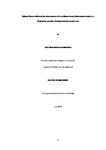Cultural factors affecting the development of an evidence-based information service in a third sector provider of complementary cancer care
| dc.contributor.supervisor | Richardson, Janet | |
| dc.contributor.author | Breckons, Matthew Dunstan | |
| dc.contributor.other | Faculty of Health | en_US |
| dc.date.accessioned | 2016-10-18T10:02:39Z | |
| dc.date.available | 2016-10-18T10:02:39Z | |
| dc.date.issued | 2014 | |
| dc.identifier | 10219041 | en_US |
| dc.identifier.uri | http://hdl.handle.net/10026.1/6554 | |
| dc.description.abstract |
Abstract Cultural factors affecting the development of an evidence-based information service in a third sector provider of complementary cancer care Matthew Breckons Introduction Many people with cancer access complementary and alternative medicine (CAM) and a need for high quality information was emphasised in reports by the House of Lords and the National Institute for Health and Clinical Excellence. Organisational culture, incorporating people’s underlying assumptions, values and actions, has been highlighted as an important factor when attempting to introduce evidence-based practices. Opinion is divided over the relevance of evidence to CAM practice, although the influence that this has on the cultural context of a CAM organisation is not understood. Aims To identify cultural factors affecting the introduction of an evidence-based information service in a third-sector CAM organisation and, in light of factors identified, to suggest feasible innovations to achieve a more evidenced-based approach. Methods Access to the charity was gained through a Knowledge Transfer Partnership. Soft Systems Methodology, a form of action research, was used to carry out four ‘learning cycles’ in which data was collected and fed back to staff at the organisation to prompt discussion on what could be improved. Learning cycles focused on improving the quality of web-based and printed information and gaining an understanding of how the information service could be improved from staff and service-user perspectives. Results Results suggested that a lack of time and emphasis on marketing values led to difficulties feeding back results and making changes that were perceived to reduce demand for the charity’s services. A lack of management support and a reluctance to implement rules made introducing any form of information policy problematic. Additionally, structural factors such as a large team of part-time staff and a lack of financial resources led to communication difficulties as well as limiting the opportunity for staff development. Conclusions This is the first study to document systematic attempts to make evidence-based changes in a third sector CAM organisation. As such, this study has generated results demonstrating how cultural and structural constraints in this type of organisation may influence attempts to make evidence-based changes. Introduction of an initiative such as the Information Accreditation Scheme (IAS) may provide benefits to an organisation of this type by guiding the development of information production systems at the same time as raising the profile of the organisation. The findings of this study strongly suggest that, despite demands from policy makers for the provision of evidence-based CAM information, there may be systematic difficulties experienced by organisations responsible for the production of this information. Further research is needed to understand how producers of CAM information can be supported in providing high quality, evidence-based materials. | en_US |
| dc.language.iso | en | en_US |
| dc.publisher | Plymouth University | en_US |
| dc.subject | Evidence-based practice | |
| dc.subject | Culture | |
| dc.subject | Complementary Medicine | |
| dc.subject | Soft Systems Methodology | en_US |
| dc.subject.classification | PhD | en_US |
| dc.title | Cultural factors affecting the development of an evidence-based information service in a third sector provider of complementary cancer care | en_US |
| dc.type | Thesis | |
| plymouth.version | Edited version | en_US |
| dc.identifier.doi | http://dx.doi.org/10.24382/4150 |
Files in this item
This item appears in the following Collection(s)
-
01 Research Theses Main Collection
Research Theses Main


